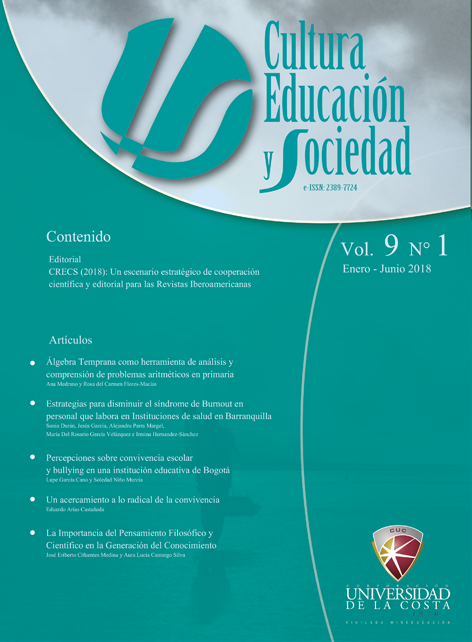Socio-economic context on the academic performance of the student through research as a pedagogical strategy
DOI:
https://doi.org/10.17981/cultedusoc.9.1.2018.13Keywords:
Socioeconomic context; academic performance; research as a pedagogical strategyAbstract
The educational institution 23 February is immersed in a social context where socioeconomic problems converge where students lack tranquility and stability in their family life, factors foster a climate of affective insecurity little record for a good school adaptation. The study sought to identify the influence of socioeconomic context on student academic performance through Research as a Pedagogical Strategy (IEP) in FDI February 23. It was guided under the qualitative approach, with an Investigation Action Participation (IAP) design. It was found that the socio-cultural be havior of children and young people from vulner able sectors is evident in the daily school as the generate behaviors such as: constant indiscipline, demotivation, physical and verbal aggression, emotional problems, desertion, reprobation, distraction, little interest in learning, among other situations, which affects the educational process taught by teachers from different educational in stitutions and the attention of students in general.Downloads
References
Bravo, H. (2008). Estrategias pedagógicas. Córdoba. Universidad del Sinú.
Erazo, A. (2012) Rendimiento académico un fenómeno de múltiples relaciones y complejidades; Revista Vanguardia Psicológica; Universidad Manuela Beltrán, Vol. 2.
Fernández, C. (2013). Rendimiento escolar y contexto social en educación primaria. (Trabajo de pregrado).
Gaxiola, J., & Contreras, Z. (2012). Influencia de la residencia metas y contexto social en el rendimiento académico de bachilleres. Revista Electrónica de Investigación Educativa. Vol. 14. Hernández, R., Fernández, C., & Baptista, P. (2010). Metodología de la Investigación. México. Editorial Mc Graw Hill.
Huaynate, V., & Anshiri, J. (2014). Factores familiares y sociales que determinan el internamiento por actos delictivos de los adolescentes albergados en el centro de atención residencial hogar para niños y adolescentes san josé inabif derivados por los juzgados de familia de la corte superior de justicia de la libertad, durante el año 2013.
Mejía, M., y Manjarrés M. (2010). Las pedagogías fundadas en la investigación. Búsquedas en la reconfiguración de la educación. Revista Internacional Magisterio 42: 16-26. Colombia.
Miquel, J., Expósito, M., & Sempere, S. (2014). Determinantes del rendimiento académico en los estudiantes de grado. Un estudio en administración y dirección de empresas. Revista de investigación educativa, 32(2), 379-392.
Mora, M., Sandoval, Y., & Acosta, M. (2013). Estrategias pedagógicas y didácticas para el desarrollo de las inteligencias múltiples y el aprendizaje autónomo. Revista de Investigaciones UNAD, 12(1), 101-128.
Ortega, P. P. (2009). Sujetos y prácticas de la pedagogía crítica. Bogotá: El Búho.
Suarez, C., & Lourdes, M. (2015). Importancia de la autoestima en niños y niñas de Educación Inicial de 3-4 años en los meses de agosto-noviembre del año lectivo 2015-2016 de la Escuela 18 de octubre.
Torres, A. (2007). La educación popular.Trayectoria y actualidad. Bogotá: El Búho.
Downloads
Published
How to Cite
Issue
Section
License
Copyright (c) 2018 CULTURA EDUCACIÓN Y SOCIEDAD

This work is licensed under a Creative Commons Attribution-NonCommercial-NoDerivatives 4.0 International License.
![]()
Creative Commons 2020 CULTURA EDUCACIÓN Y SOCIEDAD
This article is under international license Creative Commons Reconocimiento-NoComercial-SinObrasDerivadas 4.0.
The published articles are the sole responsibility of their authors and do not necessarily reflect the opinions of the editorial committee.
CULTURA EDUCACIÓN Y SOCIEDAD respects the moral rights of its authors, who assign to the editorial committee the patrimonial rights of the published material. In turn, the authors inform that this work is unpublished and has not been previously published.
All articles are under a:
Licencia Creative Commons Atribución-NoComercial-SinDerivadas 4.0 Internacional.
![]()


 English
English
 Español (España)
Español (España)




_12.53_.27_p_. m_._3.png)





_12.57_.35_p_. m_._3.png)
_12.50_.37_p_. m_._3.png)



